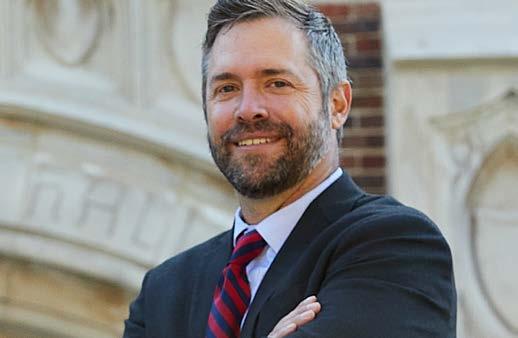
20 minute read
Editor
Advertisement
Page 3
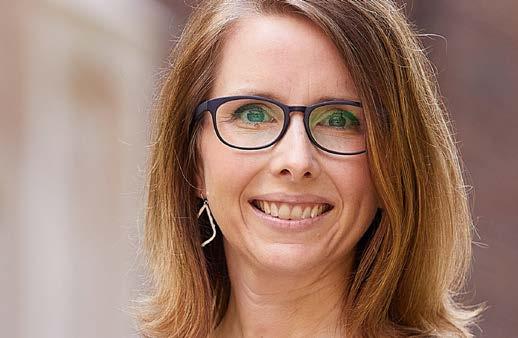
Page 5

UWL student launches fitness clothing brand: Streignth
Page 17

Page 23

Sydney Emmerich is this year’s Hoeschler Award winner
Page 24
Vol. 27, No. 1 | Building Bridges is published biannually for UW-La Crosse College of Business Administration alumni, friends, students, faculty and staff.
Direct comments to:
Taggert “TJ” Brooks
UWL College of Business Administration 1725 State St. | La Crosse, WI 54601 USA 608.785.8090 | tbrooks@uwlax.edu
Editor:
Kyle Farris
Art Director:
Dave Piro
Photographer:
Mike Lieurance, ’02
Writers:
Kyle Farris Brad Quarberg, ’85
Videographer:
Nick Ragner, ’14
The College of Business Administration is professionally accredited by AACSB International, The Association to Advance Collegiate Schools of Business.
The University of Wisconsin-La Crosse is an affirmative action equal opportunity opportunity employer and is in compliance with Title IX and Section 504.
uwlax.edu/cba
Keep in touch with the College of Business Administration and receive our biannual, online magazine,
Submit or update your information at uwlax.edu/cba/news
View Past issues
NEW YEAR, NEW DEAN Brooks named interim dean after Milner’s retirement
UW-La Crosse’s College of Business Administration has a new dean at the helm. Taggert “TJ” Brooks, a professor of economics and chair of UWL’s Economics and Finance departments, has been appointed interim dean of the college for the next two years.

Continued on page 4
Interim Dean TJ Brooks hopes to steer the college through COVID-19 while building upon the work of his predecssor, Laura Milner.
TJ Brooks
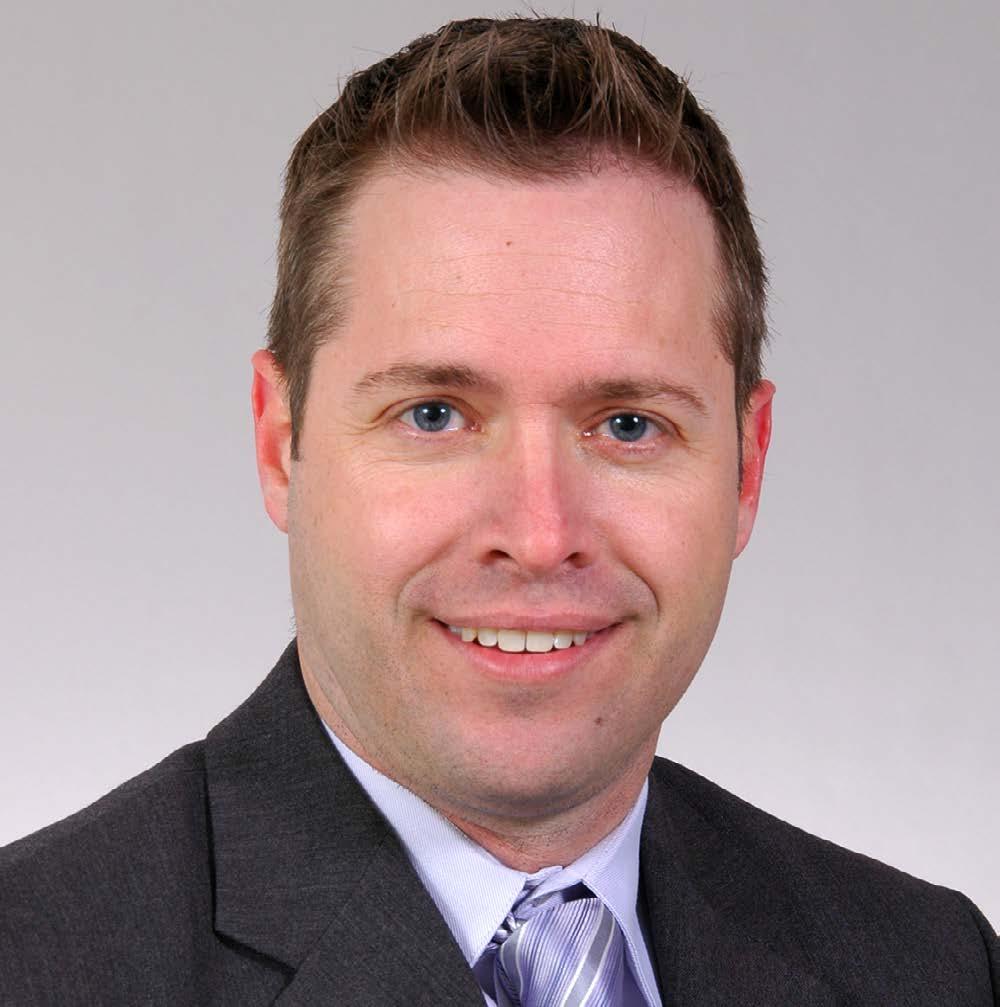
Brooks replaces Laura Milner, who announced her retirement after five years as CBA dean effective Aug. 1. Milner, who came to UWL in 2015 after a stint as associate dean for Central Washington University, is recognized for many accomplishments. She helped establish a new mission statement that pushed the college toward academic excellence, career success and community engagement. She led major improvements to curriculum, including the creation of two minors embracing data analytics and the first core curriculum overhaul in decades. “The momentum is there, and this is a good transition time for a new dean to step in and take it further,” Milner says. “The stage is set to do even better, which will be vital in the time of even more diminishing resources. As I have said before and will say again, we are just beginning the Golden Age of the College of Business Administration.” Brooks will be tasked with helping steer the college through the unprecedented times of COVID-19, while continuing to build upon the recent momentum. His biggest challenge, he says, “is continuing to support faculty, staff and students as they work and learn through this pandemic while staying safe and healthy. The next biggest challenge is managing the college through the budget challenges brought on by the virus-led economic contraction.” His ties across the community will be an asset. Brooks is known for his role in the regional business forum, “Economic Indicators” An Update for the 7 Rivers Region,” and he is treasurer for the La Crosse Community Foundation’s Board of Directors.
And she oversaw the creation of donor-funded educational programs including the Swenson Baier Engaged Faculty Fellowship and the Menard Family Midwest Initiative for Economic Engagement and Research. He has chaired UWL’s Economics Department for the past 10 years and authored more than two dozen published academic papers. He holds a bachelor’s degree from UW-Madison, and master’s and doctorate degrees in economics from UW-Milwaukee. “I enjoy exchanging ideas with people, whether with students or colleagues, and I just enjoy learning from other people,” Brooks says. “In my new role, I look forward to learning more about higher ed financing, and how to best create the right incentives to achieve our collective goals and deliver on our mission to “foster academic excellence, career success, and community engagement through enriching, interactive experiences.”
Celebrating 50 years
The College of Business Administration’s 50th anniversary celebration will be held Oct. 22 and 23, 2021. Events will include campus tours, a Wittich Hall ribbon cutting and open house, and an alumni pub crawl. Online registration will begin in March. For more information, visit www.uwlax.edu/cba/50th-anniversary. Please note that this event, originally scheduled for October 2020, has been rescheduled due to COVID-19.
Faculty Fellow
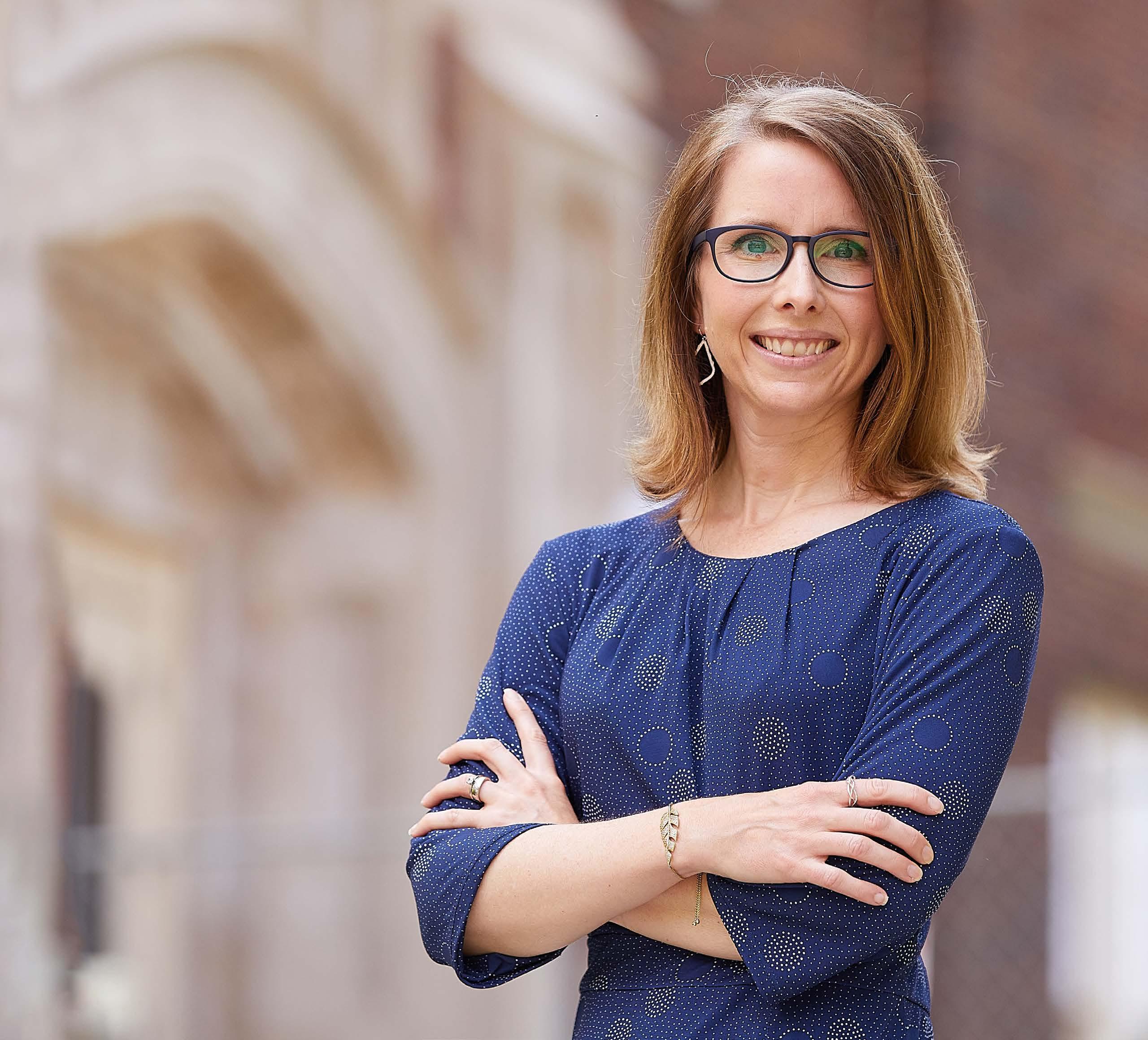
Mary Hamman, an associate professor in the Economics Department, has been named the first UWL College of Business Administration Swenson Baier Engaged Faculty Fellow. The fellowship, funded by 1985 CBA graduate Scott Swenson and his spouse, Cynthia Baier, is UWL’s first philanthropically funded faculty fellowship supporting the vision and recognition of business faculty who are industry-engaged.
An innovative associate professor who has taught in the UW-La Crosse College of Business Administration for nearly a decade has been named the inaugural recipient of the college’s first faculty fellowship. Mary Hamman, who teaches in the Economics Department, has been awarded the college’s first Swenson Baier Engaged Faculty Fellowship. The fellowship rewards and supports outstanding CBA faculty who enhance the
Mary Hamman
educational experience of their students by creating opportunities in their curriculum for students to engage with business and community leaders. Hamman says she’s thrilled to be selected and is excited to expand community engagement efforts with her colleagues. “We are so fortunate to have this opportunity,” she says. “I am committed to putting these resources to good use.”
Working with Economics Department colleagues, Hamman has been a driving force behind transforming “Economics 230-Data Analysis for Business Applications,” a required class for all majors in the college. In the class, students are coached by industry partner representatives on data analysis and presentation. Hamman says being able to correctly analyze data has become increasingly important — especially during the pandemic, which has caused economic restructuring and job turnover. She’s excited to offer workshops not only for students, but alumni and business leaders as well at no charge. “I am hoping this may help our students, alumni, and those in our local economy facing changes in employment, job roles, or plans for internships due to the pandemic,” she says. “I plan to cover an array of beginner and intermediate topics and hope to engage a diverse set of participants in terms of life experience, race and ethnicity, and career goals.” Hamman’s impact on student engagement with business and community leaders extends beyond her own classes. She and Economics Department faculty have worked to present a systematized, assessable approach to benefit all students regardless of their instructor. Hamman says the three-year fellowship allows her to complete formal training on teaching methods to ensure both her workshop and classroom teaching offer students the best opportunity to learn. She plans to extend those new skills to area businesses. “This training should enable me to deliver tailored workshops for area employers to engage and support our local economy,” she says. The fellowship begins July 1. Hamman, who has taught at UWL since 2011, is an empirical microeconomist and expert in applied econometrics and analysis of complex data sets. Her areas of interest include the economics of preventive healthcare, retirement policy and workforce aging, and long-term care. Hamman’s work has appeared in Health Economics, Health Affairs, and the American Journal of Public Health. She has received funding from the Social Security Administration, Alfred P. Sloan Foundation and the Steven H. Sandell Grant Program. Hamman is a faculty research fellow at UW-Madison’s Center for Financial Security and an associate director of UW-Madison’s Retirement and Disability Research Center. She teaches courses in health economics, business research methods, and labor and managerial economics. Funding for the fellowship is provided by 1985 CBA graduate Scott Swenson and his spouse, Cynthia Baier. This is UWL’s first philanthropically funded faculty fellowship supporting the vision and recognition of business faculty who are industry-engaged. Swenson was attracted to fund the fellowship because he believes it provides the greatest return on investment for student education and career preparedness. “I had a couple professors that were really integral in not only my success at La Crosse, but my success beyond that,” Swenson explains. “One of the things that I’ve seen in the business world is that I compare a professor to a boss or a manager. A boss or a manager, a good one, can impact hundreds or thousands of people and clearly that’s the same with a professor.” Swenson says motivated professors can relate to students and bring in things from the outside world, impacting many and setting them up for a bright future. “It was a no-brainer for me,” says Swenson. “Investing in faculty was a better path for us than any other one.” UWL CBA Dean Laura Milner says the generous gift will help keep the college competitive. “The Swenson Baier Faculty Fellowship is at the forefront of those types of gifts that change a college’s trajectory,” Milner explains. “Faculty have such an aggregate and cumulative impact on multitudes of students that dividends for years to come beyond the length of the gift itself are provided.” Milner says on behalf of the college, she expresses profound gratitude to Swenson and Baier for sustaining the CBA’s competitive edge and by embracing its 50 Years Forward theme of “Engagement, Transform and Transcend.” Swenson has 35 years of leadership experience in general management, financial and executive roles. He has owned Quest Engineering, a distributor of flow control parts, since 2013. Prior to that, he was a vice president at Polaris Industries, where he directed all operations for Polaris Snowmobile, PG&A (parts, garments and accessory), and financial services divisions, which generated more than $600 million sales and over $200 million operating income. The fellowship selection committee included Peter Haried, chair, Department of Information Systems; Will Mass, associate professor of accountancy; David Annino, lecturer of Information Systems; Mark Sandheinrich, dean, College of Science and Health; and Tanner Holst, vice chair of administration of Mayo Clinic Health System and CBA Board of Advisors member.
Hamman, shown in this 2016 photo, says the three-year fellowship will allow her to compelete formal training on teaching methods to ensure her workshop and classroom teaching offer students the best opportunity to learn. She also plans to extend those new skills to her work with area businesses.

Coming together amid COVID-19
While some classes are virtual, CBA faculty find ways to connect
COVID-19 didn’t just upend the business world, with stores and restaurants scrambling to adjust.
It also shook up UWL’s College of Business Administration, forcing students and faculty to adapt to the new reality of online education.
Over two weeks in March, faculty faced the daunting task of moving their in-person classes to virtual formats. Instructors had to identify creative solutions, while supporting students amid difficult times.
Management Professor Christa Kiersch, center, in this 2019 photo, says COVID-19 has forced her to fine tune her courses and sharpen her understanding of technology. CBA faculty have been challenged to adapt to online and hybrid instruction.

Now, with online and hybrid courses playing a key role in the fall semester, instructors say they are better prepared after the challenges they faced in the spring.
“Overall, I think it did and will have a positive impact on my teaching,” explains Christa Kiersch, an associate professor of management. Kiersch is on sabbatical during the 2020-21 academic year, but she hopes to carry the lessons of this spring into future semesters.
“It’s easy for faculty to get sidetracked, but it forced me to distill the classes and really think about the actual goals,” she says. “It also encouraged me to use different tools, strategies and get a lot better at Canvas (UWL’s learning management system).” For Nilakshi Borah, an associate professor of finance, the key to a successful online course is fostering student-to-student interaction.
Since face-to-face discussions weren’t an option in the spring, Borah used Canvas to create student-led discussion board assignments on three business cases: Whole Foods, Zorbas Bakeries (based in Cyprus) and Canadian Pacific Railway’s bid for Norfolk Southern.
Students gave group presentations on their respective cases, and asked qualitative and quantitative questions when they weren’t presenting.
It’s an approach that is suitable for both hybrid and online courses, and that she intends to use in her online classes this fall. “The main rationale behind this teaching strategy was to improve student engagement and to promote a sense of belonging,” Borah says. “Students responded well to this teaching strategy, since out of 50 students, 49 participated in all three discussion board assignments.”
Stacy Trisler, a marketing lecturer, taught two online courses over the summer — experience that will come in handy during the fall semester.
She plans to lean heavily on Microsoft Teams, which allows her to create separate channels for students doing group work. And like Borah, Trisler has structured her classes around student engagement, using a “flipped classroom” model.
Continued on page 10
Finance Professor Nilakshi Borah says the key to a successful online course is fostering student-to-student interaction. She’s found group projects and student-led discussion periods to be especially impactful.

“I’ve recorded videos of some of my lectures, so students can watch 10 minutes here, 10 minutes there, and I have a lot of activities planned for my Professional Selling class,” she says. “One example is different role-playing scenarios, which students record so we can review it later. There are a lot of activities and interaction, and I don’t want to lecture for more than a few minutes at a time.”
Other strategies extend outside the virtual classroom, spilling into the community.
Adam Hoffer, an associate professor of economics and the director of UWL’s Menard Family Initiative, compiled a collection of briefs (featured on page 12) highlighting innovative ways the Coulee Region responded to COVID-19.
The briefs detailed how a local distillery began producing hand sanitizer, and how a UWL art professor inspired hope and resilience through her paintings, among many other efforts.
“Our front-line health care and essential workers deserve the heroic accolades they receive,” Hoffer says. “We wanted to give an opportunity to praise our behind-the-lines heroes, those innovators and leaders that took quick action when action was needed most. The response was truly inspirational.” That sense of community, of togetherness, has been a major theme of UWL’s response to the pandemic — whether that’s illustrated by an emphasis on group projects and student interactions, or by faculty donating masks to local hospitals.
More than anything else, that may be the lesson CBA faculty carry into the future.
“UWL is a supportive community,” Borah says, “and we are all here to help students learn.”
CBA Scholarly Contributions JULY 1, 2019 - JUNE 30, 2020
Achenreiner, G. R., Kleckner, M. J., Knight, P., & Lilly, B. (2019). Student self-efficacy, employee engagement, and community vitality: A collaborative data collection model for regional workforce development. Journal of Education & Work, 32(6-7), 614-632. Borah, N. (2020). Is small and independent board a better board? An example of high-tech firms. Journal of Finance Issues, 18(1), 18-40. Borah, N., & James, H. L. (2020). Board leadership structure and corporate headquarters location. Journal of Economics and Finance, 44(1), 35–58. Borah, N., James, H. L., & Park, J. C. (2020). Does CEO inside debt compensation benefit both shareholders and debtholders? Review of Quantitative Finance and Accounting, 54(1), 159–203.
Chen, J. V., Heile, T. M., Kryszak, A., & Ross, W. H. (2020). Predicting Intention to Participate in Socially Responsible Collective Action in Social Networking Website Groups. Journal of the Association for Information Systems, 21(2). http://dio.org/10.17705/1jais.00604 Dahm, P., Kim, Y., Glomb, T. M., & Harrison, S. (2019). Identity affirmation as threat? Time- bending sensemaking and the career and family identity patterns of early achievers. Academy of Management Journal, 62(4), 1194–1225. David, E. M., Volpone, S. D., & Nandialath, A. M. (2019). Fostering Longevity Attitudes in Women Expatriates: The Role of General and Targeted Types of Organizational Support. International Journal of Human Resource Management, https://doi.org/10.1080/09585192.2019.1640766 Dutta, N. (2019). The Obstacle Named “Corruption”: An Empirical Analysis of Indian Firms. Review of Economics and Finance, 17, 51-64.
Eklund, M. (2019). Fairness of CEO Compensation: A Multi-Faceted and Multi-Cultural Framework to Structure Executive Pay. Cham, Switzerland: Springer Publisher. Eklund, M. (2020a). Chapter 2.3- University Direction Case: A Case of University Governance. In M. Hilb (Ed.), New Living Cases on Corporate Governance (pp. 34–42). Cham, Switzerland: Springer Publisher. Eklund, M., & Kutuk, Y. (2020). Chapter 7-Environmental Management Accounting and Sustainable Balanced Scorecard (in TR). In U. Zor & Y. Kutuk (Eds.), Innovative Approaches in Management Accounting (Yonetim Muhasebesinde Yenilikci Yaklasimlar) (pp. pg 142–162). Istanbul: Beta Yayinevi. Graham, K. W., & Wilder, K. M. (2020). Consumer-Brand Identity and Online Advertising Message Elaboration: Effect on Attitudes, Purchase Intent and Willingness to Share. Journal of Research in Interactive Marketing, 14(1), 111–132. Haried, P., & Huang, C.-L. (2019). An Evaluation of Uncertainty and Anticipatory Anxiety Impacts on Technology Use. International Journal of Human–Computer Interaction, 36(7): 641-649.
Haupert, M. J. (2019). A Brief History of Cliometrics and the Evolving View of the Industrial Revolution. European Journal of the History of Economic Thought, 26, 738–774.
Haupert, M. J., & Diebolt, C. (2019). Measuring Success: Clio and the Value of Database Creation. Diebolt, Annals of the Fondazione Luigi Einaudi: an interdisciplinary journal of economics, history, and political science, (2), 59–80.
Rousu, M., Harris, D., Hayter, J.K., Hoffer, A., Houser, S., Keller, K., Lafrancios, B., & Onaforwora, O. (2019). Students’ grade expectations in principles of economics courses: How do they vary throughout the semester and what’s the impact of feedback? Journal of Business, Economics and Technology. 22(1), 163-174. Huang, C.-L., & Haried, P. (2019). An Evaluation of Uncertainty and Anticipatory Anxiety Impacts on Technology Use. International Journal of Human-Computer Interaction, 36(7), 641-649.
Jana, D., Dutta, N., & Kar, S. (2019). Does State-level Per Capita Income affect Juvenile Delinquency? An Empirical Analysis for Indian States. Economic Modelling, 87(C), 109-120.
Kocakulah, M. C., Kesler, L., & Danko, D. (2019). On-site Health Care Clinics: Management’s Decision and Their Impact on Company Profitability”. Cost Management, 0.33(6), 5–16.
Kocakulah, M., & Komissarov, S. (2020). Using Activity-Based Costing to Increase Profitability of Individual Deposit Services in Banking, Management Accounting Quarterly, 21(2).
Leick, B., Eklund, M., & Kivedal, B. K. (2020). Chapter 5- Digital entrepreneurs in the sharing economy: a case study on Airbnb and regional economic development in Norway. In A. Strømmen-Bakhtiar & E. Vinogradov (Eds.), The Impact of the Sharing Economy on Business and Society: Digital Transformation and the Rise of Platform Businesses (pp. 69–88 in Chapter 5). UK and USA: Routledge. Leslie, L., Bono, J., Kim, Y., & Beaver, G. (2020). On melting pots and salad bowls: A meta-analysis of the implications of identity-blind and identity-conscious diversity ideologies. Journal of Applied Psychology, 105(5), 453–471. Lim, Y., Hao, X., & Kim, Y. (2019). Political capital: An analysis of Congress voting on the financial regulations. Asia-Pacific Journal of Financial Studies, (48), 869–892. Lim, Y., & Kim, K. T. (2019). Afraid of the Stock Market. Review of Quantitative Finance and Accounting, 53(3), pp 773–810.
Nandialath, A. M., & Rogmans, T. (2019). Assessing the Determinants of FDI in Emerging Markets: Do Natural Resources and Institutions Matter? IUP Journal of Applied Economics, 18(3), 80–99.
Nasif, N., Sheng, X., & Chilsen, J. J. (2020). Evaluating Consumer Perceptions of Government Services Quality. Services Marketing Quarterly, 41(2), 145-162. Nickerson, C., & Nandialath, A. M. (2019). The impact of religious salience on purchase intentions: Evidence from the UAE. Journal of Islamic Marketing. https://doi.org/10.1108/JIMA-01-2019-0005 Paudel, S., Silveri, S. (Dino), & Wu, M. (2019). Nasdaq Ex-Day Behavior: An Out-of-Sample Test. Review of Financial Economics, 38(2), 405-420. Ross, W., & Franklin, D. (2020). Characteristics of Effective Trade Secrets and Confidential Information Policies: Guidance from Labor Arbitration Cases. Labor Law Journal, 71(1), 43–57. Tsang, M. (2020). Estimating Uncertainty Aversion using the Source Method. Journal of Behavioral and Experimental Economics. 84, https://doi.org/10.1016/j.socec.2019.101477 Vriens, M., Vidden, C., & Schomaker, J. (2019). What I see is what I want: Top-down attention biasing choice behavior. Journal of Business Research. 111, 262-269. FALL 2020 11
Innovation during crisis Menard Initiative highlights creative solutions amid COVID-19
From an artist portraying hope and resilience to a distillery churning out hand sanitizer, the Coulee Region has met the crisis of COVID-19 with an array of innovative solutions.
These solutions — some meant to promote safety, others meant to lift spirits — are featured in a collection of briefs published by UW-La Crosse’s Menard Family Initiative, under the title “Innovation During Crisis: Response to COVID-19 in the Coulee Region.” “Our front-line health care and essential workers deserve the heroic accolades they receive,” says Adam Hoffer, an economics professor at UWL and the director of the Menard Initiative. “We wanted to give an opportunity to praise our behind-the-lines heroes, those innovators and leaders that took quick action when action was needed most. The response was truly inspirational.” The Initiative accepted 11 briefs across five categories: health care, business pivots, new startups, education and community resources.
While different niches of the community responded to the pandemic in different ways, the briefs illustrate an overarching theme of community service, and the power of people coming together during difficult times.

Adam Hoffer
Doctors at Mayo Clinic in La Crosse shared how the health system opened a drive-through testing site, embraced virtual doctor visits and adopted a new set of standard operating procedures.
The La Crosse Community Foundation and Great Rivers United Way created an emergency relief fund, which has disbursed more than $750,000 to nonprofits serving families in need.
And UWL professors Heather Schenck (chemistry and biochemistry) and Melissa Weege (health professions) explained how teachers used to face-to-face instruction can best serve students in virtual formats.
Others confronted the virus with a paint brush in one hand and a palette in the other.
Jennifer Williams, a UWL art professor, is painting a series of portraits as part of her “Painting Us Forward” project. The goal, she says, is to communicate hope and resilience through the faces of family, friends and small business owners enduring the pandemic.
“I began the paintings during the onset of the pandemic shutdown, realizing the impacts of social distancing on small businesses,”
Art Professor Jennifer Williams recently launched a project, “Painting Us Forward,” in which she captures the faces of friends, family and community members as they weather the pandemic. The project was featured in a collection of briefs compiled by UWL’s Menard Family Initiative.
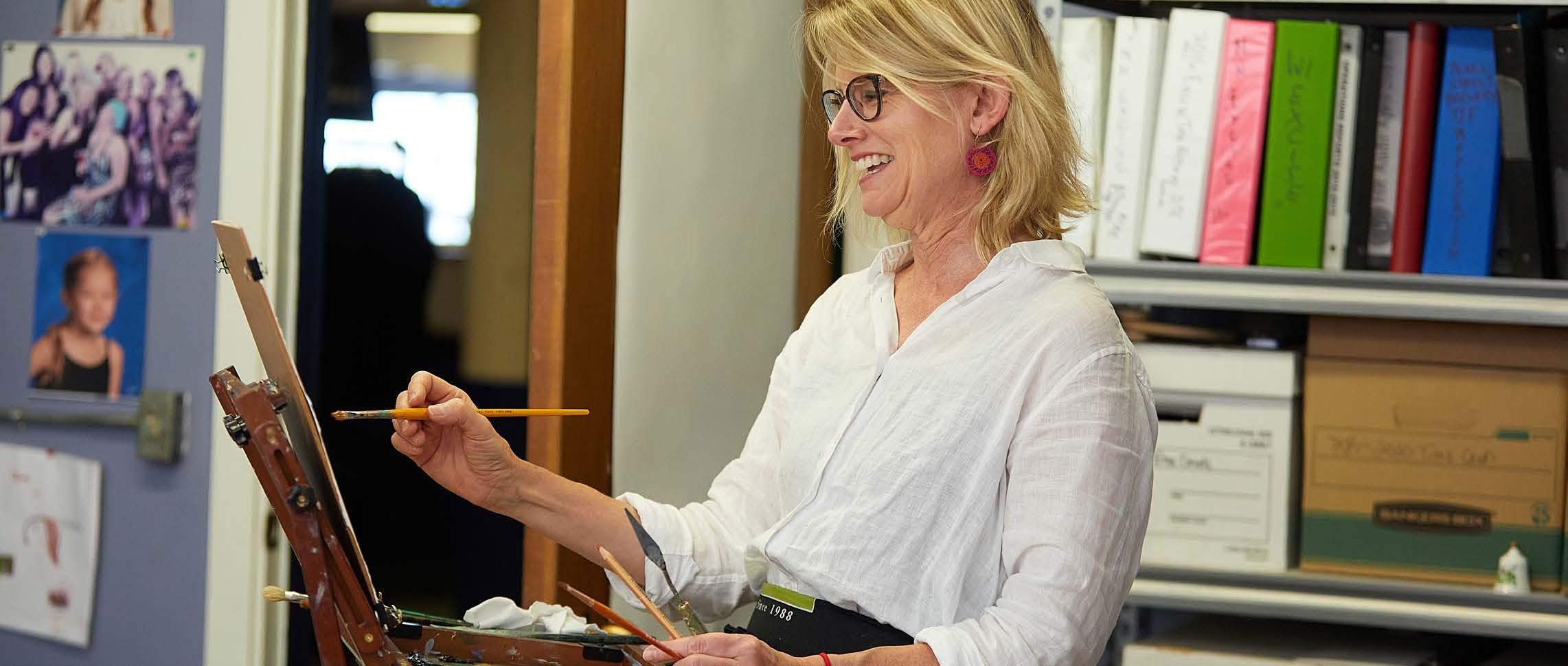
Williams explains. “The project is an artistic and empathic connection in solidarity with my community. These people and places are what make La Crosse special and unique.”
She also hopes the project will foster appreciation for art at a time when industries are given the label “essential” or “nonessential.”

“To sustain a robust and compassionate community, we need each other, and we need the arts in times of crisis,” she notes. “Right now, we are challenged to consider what is essential, and there is no doubt that art is essential to our existence, a key to hope and evidence of our resilience.”
More evidence of that resilience can be found in the home of Amy Marohl. Pre-COVID-19, Marohl, a mother of eight, ran a small Etsy shop out of her house, selling handmade items like table runners, curtains and reusable baby wipes.
When the pandemic set in, Etsy asked shop owners to consider pivoting their business to masks. Marohl, who had been making masks for local families and essential workers, saw an opportunity to grow her business while providing much needed supplies.
“Special requests from customers started coming in, asking for a certain breed of dog on the face mask, or a type of food, or to make them in a child’s size,” says Marohl, who also sold themed masks for restaurants and grocery stores. A few of her masks even became best-sellers on Etsy.
She also found a way to involve her children, four of whom are homeschooled. Each time she shipped an order to a new state, her children colored it in on a map. It didn’t take long for them to color all 50.
“The shift of focus at this time of crisis helped not only my large family, but also over 1,000 of our customers,” she says. “The support from my family was very helpful, and they are all proud to be helping others across America.”



